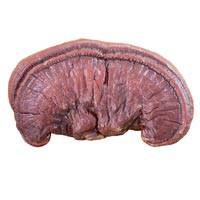 Reishi mushroom contains large amounts of polysaccharides which are food for our gut bacteria. By feeding your gut bacteria you boost diversity and colonies of beneficial bacteria which in turn boost your immune system.
Reishi mushroom contains large amounts of polysaccharides which are food for our gut bacteria. By feeding your gut bacteria you boost diversity and colonies of beneficial bacteria which in turn boost your immune system.

100% Traditional East Asian Herbal Medicine
With NO Fillers

 Reishi mushroom contains large amounts of polysaccharides which are food for our gut bacteria. By feeding your gut bacteria you boost diversity and colonies of beneficial bacteria which in turn boost your immune system.
Reishi mushroom contains large amounts of polysaccharides which are food for our gut bacteria. By feeding your gut bacteria you boost diversity and colonies of beneficial bacteria which in turn boost your immune system.
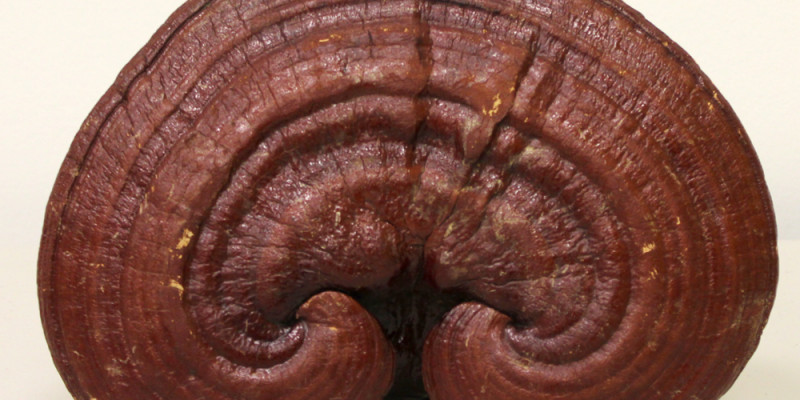
Supporting the body’s natural healing response with medicinal mushrooms
For centuries, mushrooms have been used for their medicinal and therapeutic properties. The reported benefits of medicinal mushrooms include anti-inflammatory, immune-supporting, anti-cancer, antiviral, and antioxidant effects. Traditional Chinese Medicine formulas frequently incorporate medicinal mushrooms to help support the body’s natural healing processes, which in turn can help to protect the body against common, modern-day health concerns often associated with chronic inflammation.
Healthy vs. Chronic Inflammation
Simply put, inflammation is part of the human body’s complex response to remove injury, irritation, damaged cells, or pathogens. It is the body’s necessary and natural response to harmful stimuli.
A healthy inflammatory response typically involves temporary physical symptoms such as fever, pain, and swelling to aid in the healing process and restore the normal structure and function of the injured tissues. In other words, the body must temporarily inflame in order to anti-inflame.
“Temporary” is the key word here. Yet in our modern world, many harmful external stimuli – think chronic stress, environmental pollutants, overly processed diets laden with sugar and industrial seed oils, and a sedentary lifestyle – can contribute to prolonged inflammation in the body.
Chronic inflammation has been associated in part with the development of many common inflammatory conditions, including inflammatory bowel disease, arthritis, bronchitis, atherosclerosis, and certain autoimmune conditions. A strong link has also been established between prolonged inflammation and the development of certain types of cancers.
Risks of NSAIDS
These days, the use of non-steroidal anti-inflammatory drugs (NSAIDs) is the most common treatment for reducing inflammation in the body. But NSAIDs are not a viable long-term solution. Prolonged NSAID use been associated with harmful gastrointestinal side effects such as bleeding, ulcers, lesions, and intestinal perforation. Other serious side effects include liver and kidney damage, hypertension, and other cardiovascular complications.
But there are better ways to modulate chronic inflammation.
There is a growing demand for safe and effective alternatives to conventional anti-inflammatory treatments. Western healthcare providers and patients alike are increasingly turning to forms of plant-based treatments that Traditional Chinese Medicine practitioners have used for centuries – including medicinal mushrooms.
Among the most effective, potent, and well-studied medicinal mushrooms known for its anti-inflammatory and immune-supporting properties is the powerful reishi mushroom.
What is Reishi Mushroom?
Reishi mushroom is a fungus typically found in hot, humid locations around Asia. Also known as Ganoderma lucidum or Ling zhi, reishi mushroom has long been a staple in the traditional medical systems of China, Japan, Korea, and other Asian countries for its immune stimulating and other health-promoting effects.
Reishi contains molecules such as polysaccharides, triterpines, and pepdidoglycans – compounds that have been shown to have anti-inflammatory and immune-modulating properties.
While the mushrooms can be eaten fresh, they are commonly used as a powder or as an extract – forms that are more concentrated and therefore more effective for therapeutic use.
Health Benefits of Reishi Mushroom
Proper immune function is crucial to a healthy inflammatory response. And a healthy digestive system is vital for proper immune function. Over 70% of the human immune system resides in the gastrointestinal tract. So what we consume on a regular basis directly influences the health of our gut bacteria.
One of the most important benefits of reishi mushroom is that it supports immune function when consumed on a consistent basis. Reishi contains concentrated amounts of complex carbohydrates known as beta glucans polysaccharides, which are exactly what our healthy gut bacteria like to eat.
Reishi is considered to be an effective form of preventative natural medicine due to its immunomodulatory effects. Lab studies suggest that beta glucans may help stop the growth of abnormal cells. When animals were fed these compounds, some cells of their immune system became more active.
Reishi mushrooms also contain sterols that can act as precursors to hormones in the body, along with substances called triterpenes that may have blood pressure-lowering and anti-allergy effects.
Additionally, studies have shown that reishi may alter inflammation pathways in white blood cells, which are a critical part of the immune system. Research has shown that some of the molecules in reishi can increase the activity of white blood cells knows as natural killer (NK) cells, which are responsible for fighting infections and cancer in the body.
In particular, reishi has been shown to have anti-cancer and anti-tumor effects in patients with colorectal , breast , and ovarian cancers. This potent medicinal mushroom has also been shown to improve quality of life in some cancer patients by alleviating common side effects of chemotherapy, and in enhancing the efficacy of radiotherapy.
Extracts of reishi have been shown to be protective to the liver and kidneys – unlike conventional anti-inflammatories such as NSAIDs, which have been linked to liver and kidney damage.
Even healthy individuals can benefit from the anti-inflammatory properties of reishi mushroom. One study showed that reishi improved white blood cell function in athletes after exposure to stress , suggesting that it may help aid in recovery.
And let’s not forget that the immune system is often depressed after strenuous efforts such as hard workouts, races, and competitions. Reishi can be an excellent way not only to enhance recovery, but also to help stave off the colds and flus that can crop up following a hard training block or competition – a common pain point for athletes and other active individuals.
How to Choose a Reishi Supplement
So what do you look for in a reishi supplement? As with any supplement, not all reishi formulations are created equal. The concentration and efficacy of the beneficial compounds in these mushrooms vary widely based on factors such as sourcing, storage, processing, and cooking methods.
And yet, many herbal products companies have no idea how or where their ingredients were grown or processed.
Importantly, the health benefits of reishi are enhanced when combined with other herbs – a concept that Traditional Chinese Medicine practitioners have understood for centuries. Choosing an expertly blended formula of mushrooms and herbs that work synergistically is an excellent way to maximize the overall benefit to your health.
So how can you be sure that your reishi mushroom-based supplement is made with the highest standards for sourcing, quality, and efficacy?
There’s a reason that we work with Pacific Herbs – and have for years. Pacific Herbs’ formulations are made with the highest quality concentrated herbal granules, processed for maximum potency and effectiveness, ease of dosing, and cost savings compared to capsule products.
Pacific Herbs’ Immune Boost Herb Pack™ is a potent formulation of reishi mushroom and other synergistic herbs – and is the most concentrated herbal immune support extract available, at a 10:1 extract (i.e., one gram of the product is equivalent to 10 grams of dried herbs).
In other words, you would have to eat a lot of mushrooms to equal the amount of reishi found in a single teaspoon of Immune Boost Herb Pack™!
Pacific Herbs Immune Boost Herb Pack™ contains:
• 40% Reishi mushroom (Ling Zhi), which is high in polysaccharides that feed our good gut bacteria, and may help protect against oxidative stress.
• 30% Astralgus (Huang Qi), which has been shown to have immune protective and antioxidant effects.
• 30% Red Date, Ginger Root, and Licorice Root (“The Three Sweets”), which help balance the formula and improve absorption.
• NO fillers, binders, sugar, gluten, caffeine, magnesium stearate, artificial flavors, or preservatives. Ever!
All Pacific Herbs products are non-GMO, Kosher, and vegan, and organic and wild-crafted wherever possible. Certificates of Analysis are available to guarantee the quality and purity of every batch.
Now more than ever, there is a critical need to stay healthy and protect our loved ones. Supporting the body’s immune system and innate healing response is something that we can all do. Incorporating reishi and a synergistic blend of potent medicinal herbs into our daily lives is a great place to start.
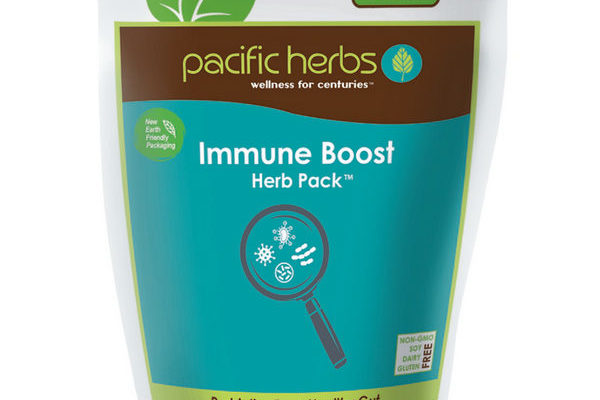
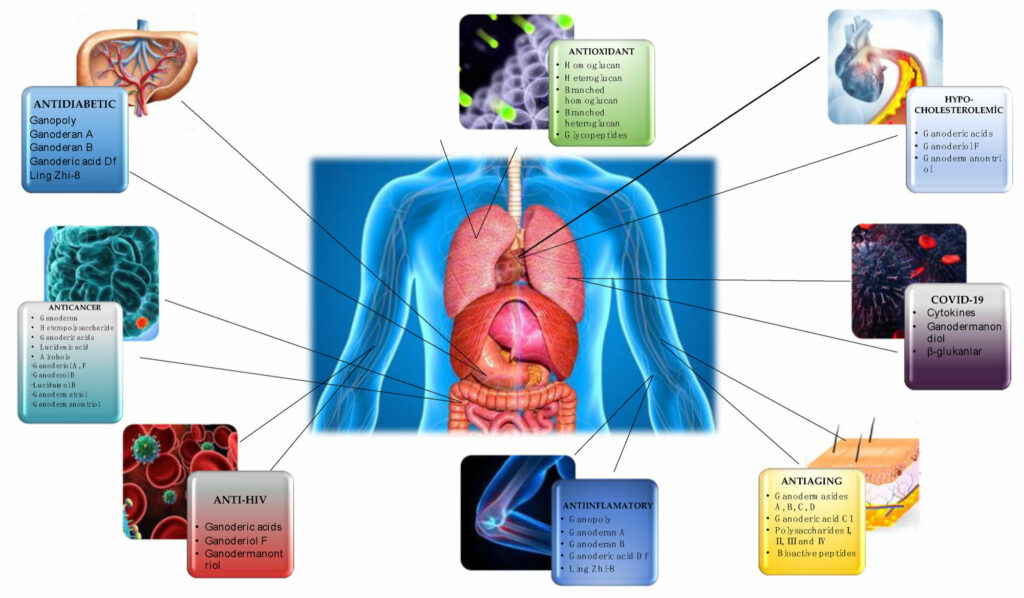
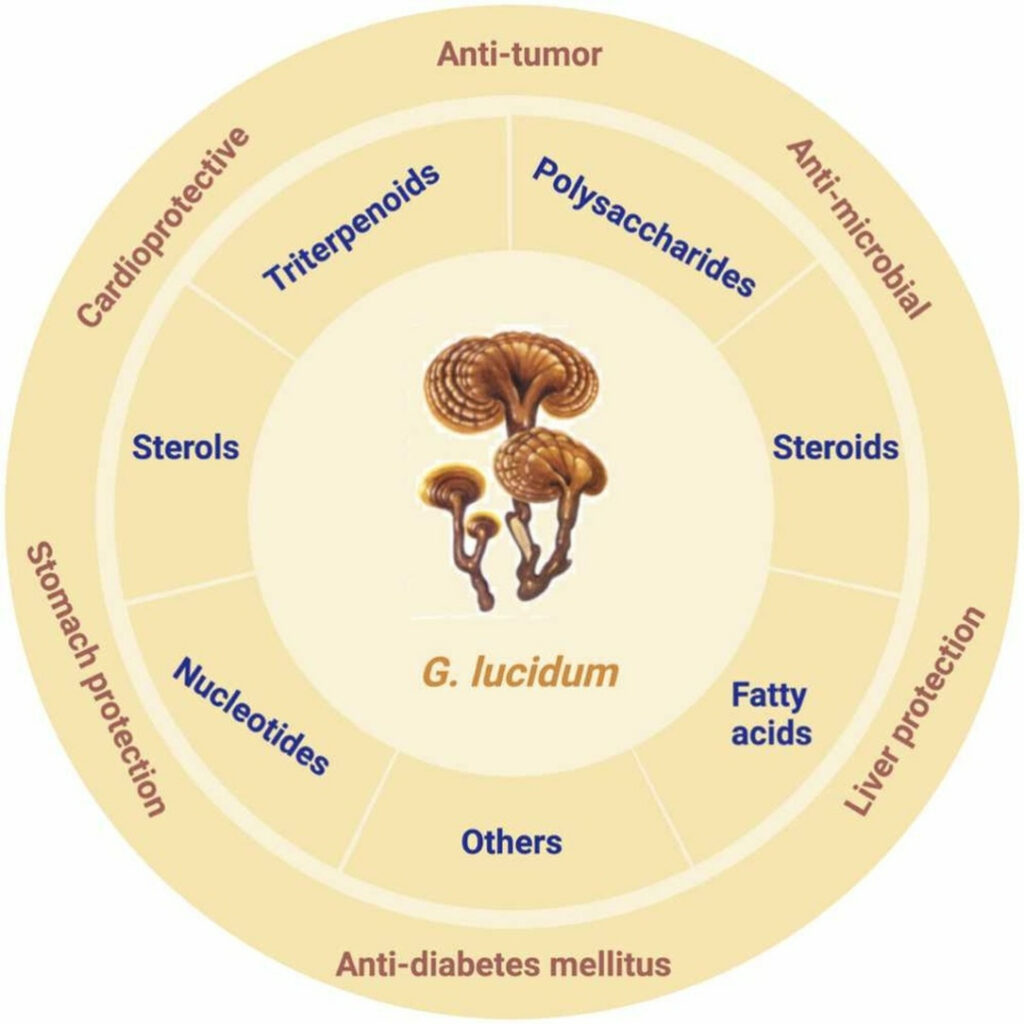
What I find fascinating is Reishi, is the fact that Reishi has hundreds of bioactive compounds with impressive medicinal properties.
For Reishi mushroom, the two classes of bioactive compounds with the most medicinal properties are the polysaccharides and triterpenes, however, it is clear that there are many other beneficial compounds.

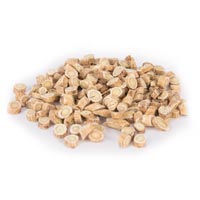
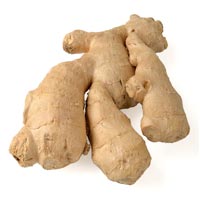
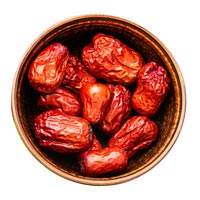
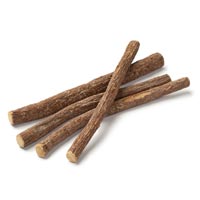

Reishi mushroom is a fungus that holds an important place in the traditional medical systems of China, Japan, Korea and other Asian countries for its health-promoting effects. It is used as an immune-stimulant. Active constituents include beta-glucans, polysaccharides and triterpenes.
Reishi mushroom antioxidant properties may enhance immune response.
Reishi mushroom contains complex sugars known as beta-glucans. Lab studies suggest that these compounds may help stop the growth of abnormal cells. When animals were fed beta-glucans, some cells of their immune system became more active.
Data from clinical studies suggest reishi can strengthen immune response in humans. In addition, reishi mushrooms contain sterols that can act as precursors to hormones in the body, along with substances called triterpenes that may have blood pressure-lowering and anti-allergy effects. Reishi mushrooms have also been shown to slow blood clotting.
Extracts of reishi were shown to have immunomodulatory (2) (3) (4) (5) (12), renoprotective (9), anti-inflammatory (36), and hepatoprotective (37) properties both in vitro and in vivo. Clinical studies indicate its benefits in improving lower urinary tract symptoms (LUTS) in men (10) (20), and in exerting mild antidiabetic effects and improving dyslipidemia (29). However, randomized controlled trials do not support the use of reishi to address cardiovascular risk factors associated with type 2 diabetes (38) (43). A pilot study of reishi spore powder did not find it helpful in treating patients with Alzheimer’s disease (AD) (1).
Reishi has also been studied for its anticancer potential. In vitro and animal studies indicate that it has antiproliferative (39) and chemopreventive effects (21), alleviates chemotherapy-induced nausea (13), enhances the efficacy of radiotherapy (22), and increases the sensitivity of ovarian cancer cells to cisplatin (27). It may also help prevent cisplatin-induced nephrotoxicity (28).
In small clinical studies, reishi increased plasma antioxidant capacity (6) (7), and enhanced immune responses in cancer patients (8) (40). There is evidence it (reishi) may have a role in stimulating host immunity and enhancing tumor response (44).
An in vitro study reported that reishi mushroom extract has toxic effects in leukocytes (14). There are also a few documented cases of hepatotoxicity (24) (25). More research is therefore needed to determine its safety and effectiveness as an adjunctive cancer treatment.
Medicinal Mushrooms: Current Use in Clinical Practice https://www.liebertpub.com/doi/10.1089/act.2020.29275.kha
Astragalus promotes T-Cells and has been shown to activate B-Cells. Astragalus contains compounds which slow cell aging through reduced telomere shortening rate, oxidative stress, and increasing DNA repair ability.
Pubmed Data: DNA Cell Biol. 2010 Jan;29(1):33-9. PMID: 19839736
Astragalus contains two isomers which decrease the expression of p16, which may slow aging. Pubmed Data : Chin Med J (Engl). 2008 Feb 5;121(3):231-5. PMID: 18298915
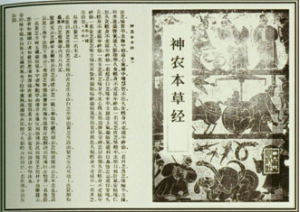 What do I find most fascinating about Chinese medicine and Chinese herbs? Maybe its because Chinese herbs are the oldest medicine on earth. Practiced for nearly 5000 years.
What do I find most fascinating about Chinese medicine and Chinese herbs? Maybe its because Chinese herbs are the oldest medicine on earth. Practiced for nearly 5000 years.
One of the oldest Chinese herbal text is the Shen Nong Ben Cao translated it is, “The Divine Farmers Materia Medica”. This foundation book in Traditional Chinese Medicine (TCM) is the book from which all others are derived.
I love history. The ability to read a 2000 year old book on the pharmacologocial activities of more than 365 plant, mineral, fish, shell fish, animal and insects is simply, AMAZING to me. (This ancient herbal medicine text was written circa 30 AD.) The use of plants and other pharmacologocial agents found in nature was explained with three key statements from the Shen Nong Ben Cao:
The highest level physician helps the patient fulfill their destiny. “The upper class of medicines…..govern the nourishment of destiny and correspond to heaven…., If one wishes to prolong the years of life without aging, one should” use these. Sheng Nong Ben Cao
Upper Class or superior drugs:
Superior drugs at the time of the Sheng Nong Ben Cao were those found to be nontoxic, and could be safely taken in large amounts for extended periods. Today we know them as tonics. (Approximately 120) Well-known superior drugs include: ginseng, licorice, di huang (root of Rehmannia), huangqi (root of Astragalus), wu wei zi (fruit of Schisandra), gan cao, (licorice) sesame seed, magnolia flower, ling zhi (Ganoderma), fu ling or poria, Chinese date (fruit of Ziziphus jujuba.), Job’s tears [seed of Coix.) and duzhong (bark of Eucommia). All of these superior herbs can be found in one or more of Pacific Herbs products.
“The mid-level physician treats constitution and helps the patient nourish their original nature.” Sheng Nong Ben Cao
“The middle class of medicines govern the nourishment of one’s nature and correspond to man. …If one wishes to prevent illness and to supplement depletions and emaciations, one should” use these.
Middle Class Drugs: (120 drugs) Middle class drugs are those that could be toxic or nontoxic, depending on usage. This included: ginger, mahuang or ephedra herb (Ephedra), danggui (Angelica sinensis), jixuecao or gotu kola, kuandonghua or coltsfoot flower (flower of Tussilaqo), yinyanghuo (herb of Epimedium spp.), haizao (Sargassum), hehuan (bark of Albizzia julibriss), gaoben, and zhuling or polyporus [sclerotium of Polyporus umbellatus.
The lowest level physician treats symptoms only.
“The lower (class of) medicines….govern the treatment of illness and correspond to earth. If one wishes to remove cold, heat and (other) evil influences (from the body), to break accumulations, and to cure illnesses, one should base (one’s efforts) on (drugs listed in) the lower (class of this) manual.” Sheng Nong Ben Cao
Inferior drugs are toxic, and are used for treating diseases and should not be used for extended periods .Inferior drugs (approx 125 include fu zi and wu tou, which are roots of aconite (Aconitum carmichaeli), rhubarb root (root and rhizome), bai tou weng (root of Pulsatilla chinensis), lian qiao or forsythia fruit (Forsythia), qing hao, croton seed (fruit of Croton), guan zhong (rhizome of Dryopteris), and lang dang zi (Hyoscyamus niger).
Many of the drugs in the Shen Nong Ben Cao are still being used today for the same medicinal reasons as the time the information was first written down. Two thousand years, their rationale can be scientifically justified. For example, the use of haizao (Sargassum) for the treatment of swelling of the neck (goiter) can be explained by its high content of iodine. There are endless examples. More than enough for another blog.
Some things never change. Even after a few thousand years.
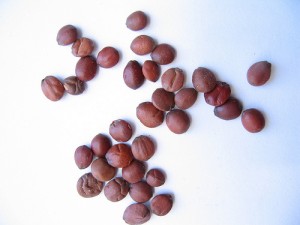 What is this funny little fruit, known as jujube, and why is it known for promoting a deeper, more restful sleep? In Chinese herbal medicine it is the seed of the fruit or spiny zizyphus. Laboratory studies of zizyphus extract have confirmed the sedative effects. In fact, the latest research from France concluded the seeds of the fruit are rich in fatty acids and a host of other beneficial compounds which can benefit those who are looking for a natural sleep aid.
What is this funny little fruit, known as jujube, and why is it known for promoting a deeper, more restful sleep? In Chinese herbal medicine it is the seed of the fruit or spiny zizyphus. Laboratory studies of zizyphus extract have confirmed the sedative effects. In fact, the latest research from France concluded the seeds of the fruit are rich in fatty acids and a host of other beneficial compounds which can benefit those who are looking for a natural sleep aid.
Jujube seeds are about the same size as a typical apple seed. The seeds have been used in Traditional Chinese Medicine and in other ancient cultures for hundreds of years. The seeds are most commonly used for their sedative effects especially common as a sleep aid. Yet, unlike so many other sedative plants or man made drugs, zizphus is extremely safe. Drinking zizphus tea has been reported to have no toxicity even in huge doses such as 50 grams per kilogram of body weight, even for 30 consecutive days.
Modern pharmacology evaluation of zizyphus seed oil and zizyphus extract suggest that with prolonged feeding (to mice) they can reduce serum triglycerides and cholesterol (mainly LDL), and reduce fatty degeneration of the liver. These same properties have also been attributed to the triterpenes of ganoderma and ginseng. Connect here to articles on ginseng and ganoderma.
Jujube has increasingly become popular as a source of over-the-counter natural sleep aid. In this just released study, different extracts of the Zizyphus exerted antioxidant activity. Hence, it is possible that the antioxidant activity of Zizyphus might be due to the presence of different vitamins and fatty acids. The study also showed that Zizyphus decoction (cooked in water) exerted an immmuno-supressive activity. Jujube is one of the main ingredients in our natural herbal sleep tea. For more information on our iSleep Herb Pac sleep aid click here.
References:
Wu Shuyun, et al., Effects of zizyphus seed oil and zizyphus extract on decrease of serum lipoprotein and inhibition of platelet aggregation, China Journal of Chinese Materia Medica 1991.
The study quoted can be found at: http://www.biomedcentral.com/content/pdf/1472-6882-10-54.pdf
Zizyphus lotus L. (Desf.) modulates antioxidant activity and human T-cell proliferation
Authors: Chahid Benammar1§,2, Aziz Hichami2, Akadiri Yessoufou2, Anne-Marie Simonin2, Meriem
Belarbi1, Hocine Allali 3, and Naim A Khan2
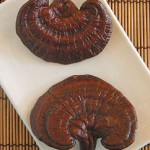 I try to bring important medical research articles to this forum to keep readers educated, through scientific studies, on Chinese Herbs that exhibit extraordinary medical results. This research was conducted in 2007 and although not as recent as some other studies I’ve mentioned, it’s relevancy is certain worthy of reporting here.
I try to bring important medical research articles to this forum to keep readers educated, through scientific studies, on Chinese Herbs that exhibit extraordinary medical results. This research was conducted in 2007 and although not as recent as some other studies I’ve mentioned, it’s relevancy is certain worthy of reporting here.
Researchers at the University of Haifa in Northern Israel, found molecules in the Ganoderma lucidum mushroom, (a popular Chinese herb) commonly known as the reishi or lingzhi in Chinese Medicine which help suppress some mechanisms involved in the progression of prostate cancer. Ling Zhi seems to be able to slow the progress of disease. The compounds identified in ling zhi were found help suppress some of the mechanisms involved in the progression of prostate cancer. They disrupt the activity of androgen receptors and impede the proliferation of cancerous cells.
Prostate cancer is one of the most common cancers among men over fifty. The normal development and maintenance of the prostate is dependent on androgen acting through the androgen receptor (AR). Mutation of AR may contribute to prosate cancer and remains important in the development and progression of prostate cancer. Current medications used to treat prostate cancer works to reduce the production of androgens or to interfere with their function via the androgen receptor.
Prostate cancer progression is also associated with increased growth factors and an altered response to growth factors by prostate cancer cells. It is thought this Chinese herb Ling Zhi helps modulate the signal pathways and may delay prostate cancer progression. This research started with 201 organic extracts from 68 types of fungi prepared with solvents such as ether, ethyl acetate and ethanol. They used these solvents to select molecules small enough to act from within the cells. From the 201 extracts, 11 successfully deter androgen receptor activity by more than 40%. Further testing showed that 169 extracts can inhibit growth of cancer cell. In this study, 14 extracts were found to be active in inhibiting prostate cancer cells.
From these active fungi extracts, the Chinese herb, Ganoderma Lucidum were tested as the most effective in inhibiting androgen receptor and controlling vital development of cancerous cells. "The results of this research are particularly interesting from a commercial aspect. Potential possibilities exist to establish research and development of bioactive components from Ganoderma Lucidum that could yield an anti-prostate cancer drug," remarked Dr. Zaidman.

